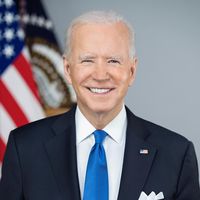The Tug of War in Washington: Balancing Tradition and Turbulence
April 16, 2025, 4:13 am

Location: United States, District of Columbia, Washington
Employees: 1001-5000
Total raised: $500K
In the heart of Washington, a political storm brews. The Senate, a bastion of tradition, finds itself grappling with a president who thrives on chaos. At the center of this struggle is Senate Majority Leader John Thune. His old-fashioned approach stands in stark contrast to the whirlwind that is Donald Trump.
Thune’s leadership style is like a steady ship navigating through turbulent waters. He understands the importance of teamwork. In a time when the Republican Party is often at odds with itself, he tries to keep everyone rowing in the same direction. This is no easy task. Trump’s presidency has been marked by sweeping changes and aggressive executive actions. Thune’s cautious support for Trump reflects a delicate balance. He wants to back the president but also serve as a check on his more extreme impulses.
The Senate has seen its share of upheaval. Trump’s first term was a rollercoaster ride, filled with feuds and frustrations. The relationship between Trump and former Majority Leader Mitch McConnell soured quickly. Thune, however, has managed to maintain a cordial rapport with Trump. This is crucial as the GOP prepares to push through significant tax breaks and spending cuts. The stakes are high, and Thune knows it.
As Thune navigates this political landscape, he faces pressure from both sides. Some Republicans urge him to stand firm against Trump’s more controversial actions. They worry about the long-term implications of Trump’s disregard for constitutional norms. Democrats, like Senator Mark Kelly, call for a stronger Republican response to what they see as unacceptable behavior. They argue that Trump’s rhetoric and actions could damage America’s international reputation.
Yet, Thune remains focused on the mechanics of governance. He aims to make the Senate function more efficiently. His push for quicker votes and more input from individual senators is a step toward revitalizing a body often criticized for its sluggishness. Thune’s background as a former runner informs his approach. He believes in speed and agility, qualities that are often lacking in the Senate.
Meanwhile, the backdrop of international tensions looms large. The recent firing of the head of the U.S. Space Force base in Greenland underscores the volatility of Trump’s foreign policy. The president’s desire to annex Greenland has sparked outrage and confusion. It’s a move that raises eyebrows and questions about America’s role on the global stage. The Pentagon’s swift action against those who challenge Trump’s agenda reflects a broader trend of purging dissent within the military ranks.
This pattern of dismissals, particularly of female leaders, raises concerns about the future of military leadership. The Trump administration’s approach to governance often feels like a game of musical chairs, with those who don’t align with the president’s vision quickly sidelined. This environment creates a culture of fear and compliance, stifling dissent and debate.
As Thune navigates these treacherous waters, he must also contend with the implications of Trump’s policies. The president’s use of executive power has been unprecedented. Thune acknowledges this but argues that it’s not unique to Trump. Previous presidents have sought to expand their authority. However, the scale and speed of Trump’s actions have left many questioning the balance of power in Washington.
The Senate’s recent bipartisan efforts to address pressing issues, such as fentanyl trafficking and immigration, show that collaboration is still possible. Yet, these victories are overshadowed by the larger political drama unfolding. The GOP is at a crossroads, caught between traditional values and the new reality of Trump’s influence.
Thune’s leadership will be tested in the coming months. The reconciliation package, a massive legislative effort, requires unity among Republicans. It’s a daunting task, especially as divisions within the party deepen. The need for teamwork has never been more critical.
In this political landscape, Thune’s old-fashioned approach may be the anchor the Senate needs. His ability to foster collaboration could be the key to navigating the storm. But as Trump continues to push boundaries, the question remains: can tradition withstand the tides of change?
The future of the Republican Party hangs in the balance. Will it embrace the chaos of Trump’s vision, or will it return to its roots? Thune’s leadership may determine the answer. As the Senate grapples with these challenges, one thing is clear: the tug of war in Washington is far from over. The stakes are high, and the outcome will shape the future of American politics for years to come.
Thune’s leadership style is like a steady ship navigating through turbulent waters. He understands the importance of teamwork. In a time when the Republican Party is often at odds with itself, he tries to keep everyone rowing in the same direction. This is no easy task. Trump’s presidency has been marked by sweeping changes and aggressive executive actions. Thune’s cautious support for Trump reflects a delicate balance. He wants to back the president but also serve as a check on his more extreme impulses.
The Senate has seen its share of upheaval. Trump’s first term was a rollercoaster ride, filled with feuds and frustrations. The relationship between Trump and former Majority Leader Mitch McConnell soured quickly. Thune, however, has managed to maintain a cordial rapport with Trump. This is crucial as the GOP prepares to push through significant tax breaks and spending cuts. The stakes are high, and Thune knows it.
As Thune navigates this political landscape, he faces pressure from both sides. Some Republicans urge him to stand firm against Trump’s more controversial actions. They worry about the long-term implications of Trump’s disregard for constitutional norms. Democrats, like Senator Mark Kelly, call for a stronger Republican response to what they see as unacceptable behavior. They argue that Trump’s rhetoric and actions could damage America’s international reputation.
Yet, Thune remains focused on the mechanics of governance. He aims to make the Senate function more efficiently. His push for quicker votes and more input from individual senators is a step toward revitalizing a body often criticized for its sluggishness. Thune’s background as a former runner informs his approach. He believes in speed and agility, qualities that are often lacking in the Senate.
Meanwhile, the backdrop of international tensions looms large. The recent firing of the head of the U.S. Space Force base in Greenland underscores the volatility of Trump’s foreign policy. The president’s desire to annex Greenland has sparked outrage and confusion. It’s a move that raises eyebrows and questions about America’s role on the global stage. The Pentagon’s swift action against those who challenge Trump’s agenda reflects a broader trend of purging dissent within the military ranks.
This pattern of dismissals, particularly of female leaders, raises concerns about the future of military leadership. The Trump administration’s approach to governance often feels like a game of musical chairs, with those who don’t align with the president’s vision quickly sidelined. This environment creates a culture of fear and compliance, stifling dissent and debate.
As Thune navigates these treacherous waters, he must also contend with the implications of Trump’s policies. The president’s use of executive power has been unprecedented. Thune acknowledges this but argues that it’s not unique to Trump. Previous presidents have sought to expand their authority. However, the scale and speed of Trump’s actions have left many questioning the balance of power in Washington.
The Senate’s recent bipartisan efforts to address pressing issues, such as fentanyl trafficking and immigration, show that collaboration is still possible. Yet, these victories are overshadowed by the larger political drama unfolding. The GOP is at a crossroads, caught between traditional values and the new reality of Trump’s influence.
Thune’s leadership will be tested in the coming months. The reconciliation package, a massive legislative effort, requires unity among Republicans. It’s a daunting task, especially as divisions within the party deepen. The need for teamwork has never been more critical.
In this political landscape, Thune’s old-fashioned approach may be the anchor the Senate needs. His ability to foster collaboration could be the key to navigating the storm. But as Trump continues to push boundaries, the question remains: can tradition withstand the tides of change?
The future of the Republican Party hangs in the balance. Will it embrace the chaos of Trump’s vision, or will it return to its roots? Thune’s leadership may determine the answer. As the Senate grapples with these challenges, one thing is clear: the tug of war in Washington is far from over. The stakes are high, and the outcome will shape the future of American politics for years to come.


